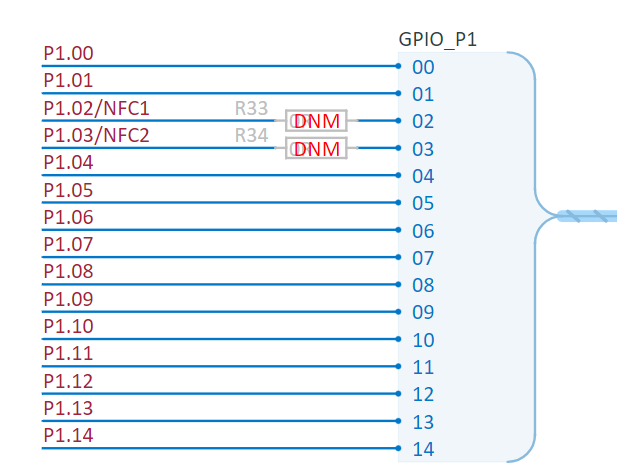Hello,
I have failed to get the I2C working on the nrf54l15dk, i have now connected it to a oscilloscope with pull ups.
i have confirmered the pull ups work, but as i have my oscilloscope never triggers it means the signal is never going low.
is there something i am missing?
#ifndef MAIN_H #define MAIN_H #include <zephyr/kernel.h> #include <zephyr/drivers/gpio.h> #include <zephyr/drivers/i2c.h> #include "../firmware/bhi360.fw.h" /* 1000 msec = 1 sec */ #define SLEEP_TIME_MS 1000 /* The devicetree node identifiers for chip select and another GPIO. */ #define CS_NODE DT_NODELABEL(cs_pin) #define SDO_NODE DT_NODELABEL(sdo_pin) /* The devicetree node identifier for the "led0" alias. */ #define LED_NODE DT_ALIAS(led1) /* The devicetree node identifier for the BHI360 sensor. */ #define BHI360_NODE DT_NODELABEL(bhi360)
#include <stdio.h>
/* GPIO configuration */
static const struct gpio_dt_spec led = GPIO_DT_SPEC_GET(LED_NODE, gpios);
static const struct gpio_dt_spec cs_pin = GPIO_DT_SPEC_GET(CS_NODE, gpios);
static const struct gpio_dt_spec sdo_pin = GPIO_DT_SPEC_GET(SDO_NODE, gpios);
/* I2C device */
static const struct i2c_dt_spec bhi360 = I2C_DT_SPEC_GET(BHI360_NODE);
int main(void)
{
configure();
while (1) {
blink_led();
int ret;
uint8_t config[2] = {0x03,0x8C};
ret = i2c_write_dt(&bhi360, config, sizeof(config));
if(ret != 0){
printk("Failed to write to I2C device address %x at reg. %x \n\r", bhi360.addr,config[0]);
}
k_msleep(SLEEP_TIME_MS);
}
return 0;
}
&pinctrl {
i2c1_default: i2c1_default {
group1 {
psels = <NRF_PSEL(TWIM_SDA, 2, 1)>,
<NRF_PSEL(TWIM_SCL, 1, 3)>;
};
};
i2c1_sleep: i2c1_sleep {
group1 {
psels = <NRF_PSEL(TWIM_SDA, 2, 1)>,
<NRF_PSEL(TWIM_SCL, 1, 3)>;
low-power-enable;
};
};
};
/ {
aliases {
i2c1 = &i2c21; // Creating an alias for easy referencing if needed
};
};
/* Enable I2C and configure pins */
&i2c21 {
compatible = "nordic,nrf-twim";
status = "okay";
clock-frequency = <I2C_BITRATE_STANDARD>; // 100kHz standard clock frequency
pinctrl-0 = <&i2c1_default>;
pinctrl-1 = <&i2c1_sleep>;
pinctrl-names = "default","sleep";
bhi360: bhi360@28 {
compatible = "bosch,bhi360";
reg = <0x28>;
label = "BHI360";
status = "okay";
};
};
/ {
gpio_signals {
compatible = "gpio-keys";
cs_pin: chip_select_signal {
gpios = <&gpio0 5 GPIO_ACTIVE_HIGH>;
label = "Chip Select Signal";
};
sdo_pin: sdo_signal {
gpios = <&gpio0 7 GPIO_ACTIVE_HIGH>;
label = "SDO Signal";
};
};
};
CONFIG_I2C=y CONFIG_GPIO=y CONFIG_I2C_NRFX_TWIM=y
king regards Luca




